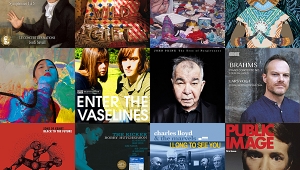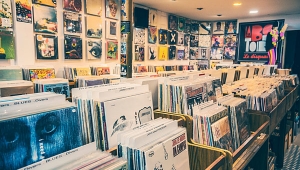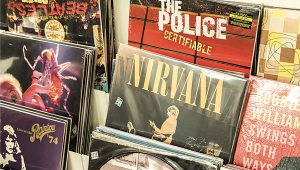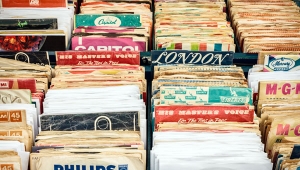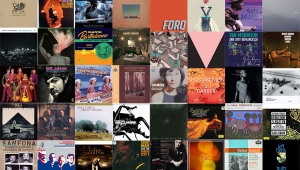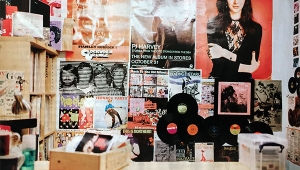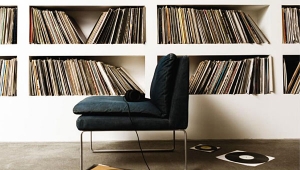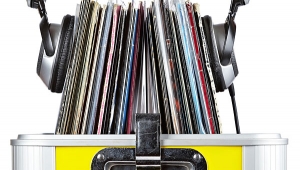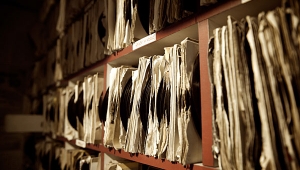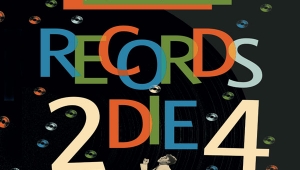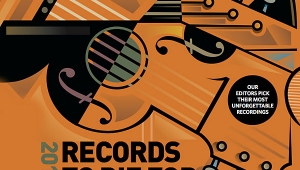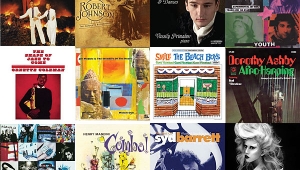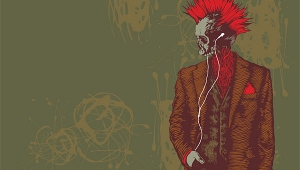| Columns Retired Columns & Blogs |
2007 Records To Die For Page 5
MATTHEW FRITCH
THE MENDOZA LINE: Lost in Revelry
Misra MSR011 (CD). 2002. Ray Ketchem, Jerry Kee, Peter Langland-Hassan, prods.; Dave Steele, mastering. AAD? TT: 48:11
KEITH JARRETT: The Carnegie Hall Concert
Keith Jarrett, piano
ECM 1989/1990 (2 CDs). 2006. Keith Jarrett, Manfred Eicher, prods.; Martin Pearson, eng. DDD. TT: 110:23
PHILLY SUPER SOUL HITS: Various Artists
Epic/Legacy EK 85937 (CD). Kenny Gamble, Leon Huff, prods.; various engs. AAD. TT: 76:05
JAMES HUNTER: People Gonna Talk
Rounder 11661-2187-2 (CD). 2006. Liam Watson, prod., eng.; Noel Summerville, mastering. AAD. TT: 41:01
THE MENDOZA LINE: Lost in Revelry
Misra MSR011 (CD). 2002. Ray Ketchem, Jerry Kee, Peter Langland-Hassan, prods.; Dave Steele, mastering. AAD? TT: 48:11
The alt-country genre doesn't need more sad-sack guys with guitars or lonesome, pining cowgirls. What makes Lost in Revelry so engaging is that it plays out like an epic lovers' quarrel, the aggrieved parties hurling insults at one another across the bar. All the shame and blame is doled out by singers Tim Bracy (a Dylanesque rambler), Shannon McArdle (a twangy, sassy siren), and Pete Hoffman (a liltingly melodic choirboy). Like an American version of the Mekons, the Mendoza Line stumbles along an Anglo/Southern jangle-rock line, its boozed-up bluster masking the emotional pain of three very smart songwriters.
JAMES: Laid
Fontana/Mercury 314 514 943-2 (CD). 1993. Brian Eno, prod.; Benedict Fenner, eng., mix; Markus Dravs, mix; Steve "Doc" Williams, eng.; Ben "Jude" Findlay, asst. eng. AAD? TT: 55:39
A Manchester sextet that served as a surrogate Smiths during Britain's rave era, James is best known in the US for this album's title track. "Laid" was an alt-rock radio hit featuring flamboyant singer Tim Booth's most grating yodel, but its theme of casual sex is only a minor annoyance in the context of this grand, romantic mood piece of an album. Producer Eno shapes a weather system of placid pop synths, murmuring guitars, and drums malleted or brushed, making a bed for Booth's ruminations on paranoia, religion, and life's little ecstasies. The Laid sessions proved so fruitful that a second disc of material cowritten by Eno and James, Wah Wah, was issued a year later.
LARRY GREENHILL
KEITH JARRETT: The Carnegie Hall Concert
Keith Jarrett, piano
ECM 1989/1990 (2 CDs). 2006. Keith Jarrett, Manfred Eicher, prods.; Martin Pearson, eng. DDD. TT: 110:23
The Carnegie Hall Concert was not only chosen by Richard Lehnert as one of Stereophile's two "Recordings of the Month" for October 2006, it was also highlighted in the "Arts & Entertainment" section of the New York Times on Sunday, September 24, 2006. RL found the album "warm and celebratory," and I agree. This extraordinary set entirely captures the intensity and precision of Jarrett's blues and jazz improvisations, as well as the ecstasy of the audience, whose applause takes up more time than on any other album I know of. Jarrett rewarded their clamor with five encores. He spoke about the "conversation between the audience and myself" that culminated in the evening's first encore, "The Good America," which Nate Chinen of the Times called hymn-like, "pastoral Americana," an "anthem to that imaginary land." Jarrett's encore performance of his lyrical ballad "My Song" is so sumptuous that it's become my favorite piece on this set. Jarrett reported that "The emotional color of the hall in New York was so accepting and prepared and uncompromising and willing to go through whatever process I was going through." I have to agree with the Times and the audience—this is an extraordinary recording that captures a magical concert. It was also the first album I downloaded from Napster.com, and was worth the time and the $19.76. (XXIX-10)
FELIX HELL: Organ Sensation
Felix Hell, organ
Reference Recordings RR-101CD (HDCD). 2003. J. Tamblyn Henderson, prod.; Keith O. Johnson, eng. DDD. TT: 59:52
Despite his unconventional name, Felix Hell has suddenly become one of my favorite organists. This recording was made in 2002, when Hell was 17 years old. By then, he had completed almost nine years of recitals, tours, and recordings. Born in Frankenthal/Pfalz, Germany, the seven-year-old Felix startled his parents by playing J.S. Bach's Prelude in C Major, from Book I of The Well-Tempered Clavier, after seeing another pianist play it. Piano lessons, organ lessons, and recitals soon followed. His extraordinary artistic sensibility swept me off my feet on first hearing his rendition of Rheinberger's Abenfriede (Evening Peace) on this disc. His playing brings out the work's delicacy, grace, and lyricism, drawing me into the recording with its silences, pianissimo sections, and polyphony. Keith Johnson's recording skills capture the full frequency range, mixing subterranean pedal chords with the upper registers, so that my room resonated, even at low volumes. Hell's technique reminded me of Glenn Gould's ability to articulate each note so that it stood clearly on its own, regardless of the tempo. Liszt's Prelude and Fugue on B-A-C-H allows Hell to reveal the rich palette of orchestral color and warmth of the Schoenstein organ of the First Plymouth Congregational Church, UCC, in Lincoln, Nebraska. He also shows a profound understanding of the organ literature, and an ability to communicate lyricism through the massive instrument.
BOB GULLA
PHILLY SUPER SOUL HITS: Various Artists
Epic/Legacy EK 85937 (CD). Kenny Gamble, Leon Huff, prods.; various engs. AAD. TT: 76:05
I had dinner recently with a fellow journalist. In typical music-geek fashion, we discussed great soul music. I posited that the music from Stax in the late 1960s (Otis Redding, Booker T., etc.) was the best and purest form of American music. (The wine was flowing.) He agreed, but thought that in terms of melody, hooks, and round rhythms, the Philly sound of the '70s, known in some circles as T.S.O.P., trumped Stax hands down. "When Will I See You Again," "Love Train," "Bad Luck," "Me and Mrs. Jones"—his argument was tight and convincing. And the songs spoke for themselves. I was speechless. We refilled our glasses and toasted Philadelphia.
BAD BRAINS: Rock for Light
Caroline 1613 (CD). 1983/1991. Ric Ocasek, prod.; Ian Taylor, eng. AAD? TT: 42:02
At their apex, Bad Brains were a force of nature. Not only could they play their instruments—they began as a jazz-rock fusion band in DC before hitting hardcore—they were also visionaries. Rock for Light, remastered in 1991 and reissued with three extra tracks, contrasts punk blasts with dub reggae idylls, the latter giving the listener a much-needed break from all the Sturm und Drang. Before this album, the band was energetic but primitive. After it, they ditched their punk conventions in favor of heavier rock'n'roll. It's here that, with producer Ric Ocasek, Bad Brains serve up the perfect storm of Rasta sound and hardcore fury.
JON IVERSON
JAMES HUNTER: People Gonna Talk
Rounder 11661-2187-2 (CD). 2006. Liam Watson, prod., eng.; Noel Summerville, mastering. AAD. TT: 41:01
We stumbled on Hunter and his band at this summer's California mid-state fair and, though I'd read the stories in Mojo, I had no idea what we were in for. The show knocked us out, and afterward we headed over to buy a CD. Hunter himself was signing discs, every bit the smooth British gentleman as the locals smiled and stared. Little did we know that this would turn out to be our favorite new recording of 2006. People Gonna Talk was recorded live to mono at infamous analog-only Toe Rag Studios. Hunter comes off as a cross between Sam Cooke and Ray Charles—like turning on the radio and all of sudden it's 1962. Great sound, tunes, and smokin' band, all in one. A no-brainer.
San Francisco Psychedelia Bonanza
QUICKSILVER MESSENGER SERVICE: Quicksilver Messenger Service
Capitol CDP 7 91126 2 (CD). 1968/1994. AAD.
SONS OF CHAMPLIN: Loosen Up Naturally
Acadia ACA 8067 (CD). 1969/2003. AAD.
H.P. LOVECRAFT: Two Classic Albums from H.P. Lovecraft (I & II)
UMG 314542821-2 (CD). 1967–68/2000. AAD.
IT'S A BEAUTIFUL DAY: It's a Beautiful Day
San Francisco Sound SFS 11790 DA (CD). 1969/2001. AAD.
For my "R2D4" no.2 it was a perfect four-way tie: four stone(d) classics that belong in any collection of 1960s psychedelic rock. These acts were regulars around San Francisco at the time, but none of them had a worldwide hit that would cement their hall-of-fame status, as did Jefferson Airplane and Janis Joplin (although It's a Beautiful Day, led by violinist David LaFlamme, scored a minor hit with "White Bird," and Quicksilver made some progress with "Pride of Man"). Nonetheless, they were equally accomplished, and these discs are packed with great music. Anyone who wants to explore the "San Francisco Sound" and is ready to go beyond the Grateful Dead and "White Rabbit" can pick up the trail right here.
- Log in or register to post comments

